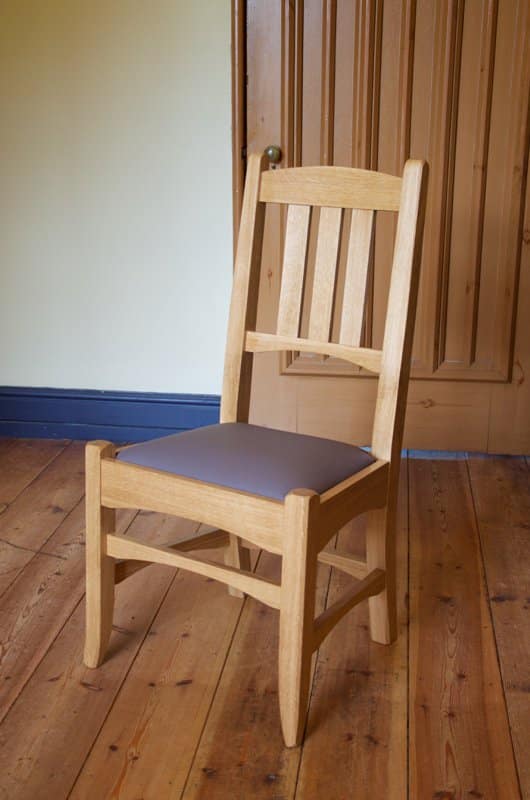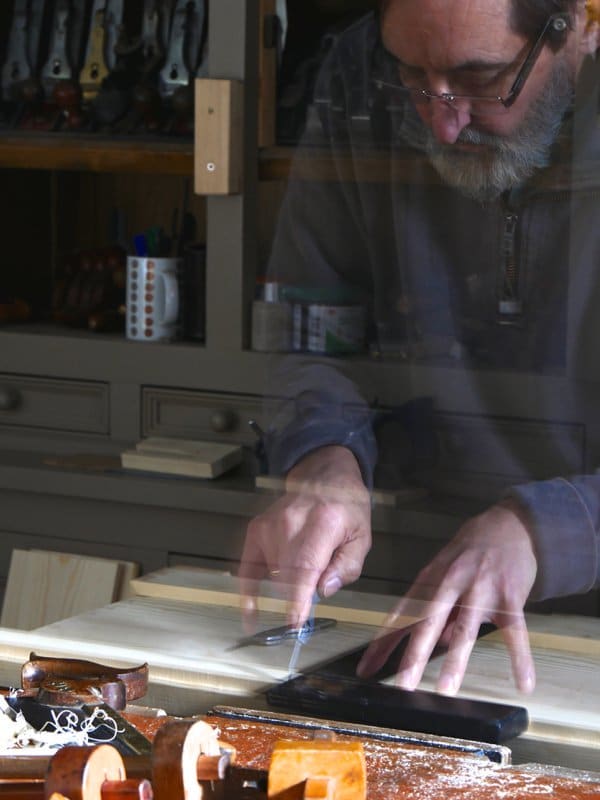Doing business with different people
Sharing your work with people looking for hand work
Finding customers that support craftwork like mine is essentially your primary work once you’ve made your pieces and established a portfolio. Your customers are not someone you barter with as such, or haggle over the price of your work, but someone who respects what you’ve made. Every day people come into the workshop and ask for a price of something. This is the point where educating my customers begins. The barriers are down and we have common ground to talk about my work. It’s not a point where we become a negotiating entity to find out the real price I’m willing to go down to. This is a different world where someone walks and wants to buy for an honest investment in something they just cannot buy almost anywhere. Attitude here is everything.
I generally encourage woodworkers going into self employed business to ignore their bankers, to not borrow money for startup (esp from family) and to not listen to naysayers who say you can’t make your living from being a woodworker because of course there are indeed many more that fail at it than are successful. Usually the ones that say you can’t make it couldn’t, wouldn’t or shouldn’t do it themselves and are not usually the best ones to take advice from, but of course you could listen to them out of courtesy.
Talking to Sam today I recounted my experiences over the decades of dealing with certain customer types that can, if you let them, make life difficult. I thought it might help you too.
You must of course make some decisions when you start your business. Are you going to retail yourself, which means dealing directly with the individual customer, or are you going to wholesale? Its simple enough and you might do both of course. Dealing wholesale means selling at half the retail price usually. That means your days can be spent making instead of being in the retail store selling for larger chunks of the day. Let’s deal with direct customers as retail buyers.
There you are busy as a bee and a man drives up dressed for holiday (vacation US) or the golf course and sees your beautiful work. “Wow, stunning work!” he declares and wanders around touching the pieces. You talk back and forth and before you know he is entertained and you lost an hour of productive work time. He’s semi retired and you need to be making. Suddenly he dips into his hip pocket and pulls out his wallet. It’s at this point when you may have sold something for £20 or £2,000. He says, “How much for cash?” This is him telling you to do or don’t do one or any of the following: 1) Pocket the cash and don’t put it through your books. 2) Don’t charge VAT (or any tax). 3) Give him a discount just because he’s paying cash. 4) Conspire with him to be equally dishonest. This man has no sense of who you are. He wants a deal and does not want to pay you what you are worth, but it’s part of their world and they want to feel they have bettered you and bettered themselves by owning a part of you. Some might say that’s a bit harsh, but I have always been hard working to the detriment of my own wellbeing for the benefit of my customers.
I look at these scenarios and of course you, you yourself, don’t have to be dishonest at all. Of course it does tell you something of his character. I wouldn’t allow anyone to manipulate me or work dishonestly so I think any crafting artisan should decide that from the beginning and not sell him or herself short.

It’s on another occasion someone in the studio selected several pieces of furniture, walked over to the counter and asked how much if she buys the six chosen pieces. Now that’s different than asking how much it is for the six pieces. Again we see a certain expectancy. The question arises again, does that really warrant entering the arena of discount pricing as if you had the same parameters of a more common furniture store? The reality is that you didn’t buy what you’re selling from some other entity but you made every part with your own hands and worked each piece to correspond perfectly with its partnered piece. The piece you made holds your concept of design within its constructs. The design itself has a value only you can determine. Though of course it has something to do with hours taken to make it, complexness, things like that. But the design might be worth all the more because its so very simple. These issues surround the value of what you and your work is worth, so it’s as much to do with your involvement that others must see rather than some design bought by another party.
You must of course do what you must in times when a sale can make the difference, but working with your customers is not working other people’s customers because most of what is bought today would not be made by someone standing in front of you or someone from the same town, the same country or even the same continent. These things have additional value and are things you must consider and work through. They are important in establishing a protocol for you to live with as you grow, but they are more important in evaluating self worth that defies discounting your worth in a world where craftsmanship and a local crafting artisan hangs on by a very long and thin thread.
We can talk more about pricing your work for a real world soon.


Paul,
Haven’t stopped by in awhile. Saw the title of the email and took some time to gain some wisdom. I like your perspective and it’s one learned through experience. Many woodworkers sell short because they fail to calculate the all the costs and the time as well as value of the creativity put into the piece.
During this last financial recession many of the middle class buyers of fine furniture lost their disposable income. I know many excellent Minnesota woodworkers that did not survive, and many who did. I like that you tell the potential woodworker not to go into financial debt or risk. It reduces stress.
I’d send the “Wheeler Dealer” to IKEA. LOL! But as you remember, I’m guessing you ate a lot of peanut butter and jelly sandwiches? What I’m hearing you say is “value your work and don’t sell yourself short.”
James Krenov was that type of guy, but he had the support of a wonderful woman who believed in him, when he began making his way. When he was at his peak and people were paying galleries that sold his Art Furniture, he would also build a piece for someone almost at his cost. But they had to wait and there was no deadline.
Have a great day, and keep inspiring creativity and craft!
Thanks!
How many Sam Maloofs, James Krenovs or Tage Frids do we have in the woodworking world? I know a woodworker who builds things and tries to sell them at prices that he thinks are fair. Many of them — especially the big, one of a kind pieces — are not moving, including a few pieces more than four or five years old.
The reality is unless a woodworker has a secondary source of income (or support from her or his family), 9 out of 10 woodworkers need to live a frugal life. Some of those I know are happy and enjoy what they do (and that is what really matters), even though they could have made more money by having some other day-time jobs.
Richard
I agree with Richard also. Surely most of the revenue you need, to keep doing what you do, Paul, comes from your Masterclass subscribers?
I have for decades made my living solely from making furniture and woodworking and I could do it again. That said, I am pleased and proud of the work I currently do to help others to develop their interest and skills in my craft.
Very well said Paul. Thank you for all you have done to teach real woodworking. I like what Paul has said about putting a real value to ones work. I’m not sure of other countries or continents but here in the U.S. i see woodworkers competing with one another on price alone, selling a piece of furniture for half its worth. It seems like a battle to just see who can build for less. I believe it’s only hurting themselves, and that I want no part of. In some ways I think it goes back to the revolution of the 20th century.
These bits of business wisdom are valuable, Paul. As valuable as anything else you’ve passed on to date.
My wife had a small business for awhile selling her handcrafts, so I can appreciate the dilemma of pricing and how the average person values craft work. Someone won’t think twice about paying a contractor in the US $45-$55 per hour for a laborer, $150+ for a skilled tradesman, but balks at paying a break-even price for a piece of work that required skilled craftsmanship, expensive materials, and many hours to create.
Thanks for publishing your views on this subject, which is one very seldom discussed. You have outlined the various scenarios very clearly, and I hope that, at some future point, you will state, equally clearly, how you yourself react to the different kinds of customer, always allowing for your present situation. As you say at the end of your piece, it’s different if you must have the income. Then, you *have* to compromise.
In my work as an organ-builder (focused almost entirely on tuning/maintenance, repairs and alterations) have frequently put in unpaid-for hours. This is sometimes because the job was more time-consuming than I expected (every job being a one-off and therefore impossible to estimate for accurately) but often because I did a lot of extra work, which the client had not asked for, because I knew it needed to be done and would result in a much better end-result. Why do I do this? Simply because I am more interested in the job than in making a profit. I realise that I am very fortunate to be able to take this attitude, which is made possible, in part, by a way of life which many would find frugal, but which I see as perfectly normal.
One thing is certain, however. Any fool can work for nothing (or very little) so just make sure that If you find yourself in this position, it is because you chose to do it. After 35 years or so, I am still happy and interested to be doing my job, I am financially secure, and I have no intention of ‘retiring.’ There is nothing else I would want to do. How many people can say that, these days?
I resent you using the word fool, many of us are not financially secure and like myself I have to work two jobs both at minimum 12 hours a day one I enjoy that is working wood and the other I despise but both earn squat which means working for a handful of peanuts. it’s not my choosing but the economic rut we live in. Your word “fool” reminds me of our Australian Treasurer Joe Hocky when he said in an interview sitting in his grand elaborate chair smoking a fat cigar and sipping brandy ” we’re going to have to tighten our belts.” Maybe if the table was turned you too would work for peanuts just to put a piece of bread on the table.
Regrettably, I think you have misunderstood my comment, possibly because we come from different backgrounds – the UK and Australia.
By, ‘Any fool can work for nothing …’ I merely meant that, as a self-employed person, is is very easy to work for nothing, or next to nothing, if you don’t charge properly. I know. I *have* done just this on many occasions.
What I did *not* write, was, ‘You are a fool if you find yourself in a low-paid job,’ which seems to be how you interpreted my comment.
The phrase, ‘Any fool can …’ is a common one, in my experience, as in ‘Any fool can cook,’ meaning, ‘It’s easy to cook.’
Oh, and by the way, when I first started out in self-employment, I offered my services, not for a low figure, but for NOTHING. I was as desperate as that. The gambol paid off, as it happens, and I still do work (properly charged for, now) for those same people, over 30 years later. It was a way of getting their attention, and making sure they gave me the job!
I hope your circumstances change for the better, in the near future.
Looking over this, I see ‘gambol’ instead of ‘gamble.’ Best blame the computer and its automated spelling – I always do!
My apologies then for misunderstanding your chosen word, it’s strange though how certain words are used in one part of the world and not others even though we all speak the Queen’s language and our ancestral roots derive from the one country.
Very true!
I am not sure which part of Aus you hail from but on the Western side I have had a great many customers from all levels of wealth and I have found one thing. If I have had the self belief to walk away from a ‘bargain hunter’ inevitably I have done myself a favour. Joe Hockey is not a great example of a common Australian from the little that I know- how many people own 4 properties spread over more than one state? I too have done the multiple job dance, fortunately in occupations that I have had equal amounts of enjoyment out of but still draining when twelve hour days are involved. Keep building on yourself and your skillset and don’t be afraid to charge a bit more if it is that tight. How many people actually invest so heavily in themselves and appropriate equipment/tools to earn a crust? Some of my customers are shocked. The realistic ones already know and the ones who don’t question and just pay do so because they judge not on what they are paying but on what they can compare the quality of the workmanship to. It does sadden me somewhat that a lot of the stories I hear are about bad tradespeople conducting poor quality work. I have done some jobs at zero profit- by my own hands and with my own hands.
I love this line of blog posts about practical issues to consider when lifestyle woodworking (for a living). As someone who is not there yet, but trying to slowly move in that direction, I find them both educational and inspiring. I hope the follow-up about setting prices comes soon.
@salkosafic: I’m pretty sure Organbuilder was not trying to insult people who work for “peanuts”. It sounds like he’s not Scrooge McDuck himself. It’s easy–not necessarily easy work, just easy to find oneself here–to work for little “just because”. It’s much, much harder to do it on purpose, based on a preferred lifestyle that does not buy in to the concept that money trumps all else.
You are correct. I wrote my reply (above) before noticing yours.
On a related topic, there is a major difference, in the self-employed context, between making a product and then trying to sell it, and what I am usually asked to do, which is give a price on a complex repair job, involving an instrument which is usually over a hundred years old and very much an unknown factor until you take it apart. In the first instance, at least you will know what it cost you to make, say, the chair in time and materials. You can then come to a decision on how much you would like it so sell for. In my case, I have to estimate a cost and then do the job to that price. Often (very often) it turns out to be much more time-consuming, so the estimate is way out. The client, of course, does not expect to be charged any more (understandably.)
We all of us have our own problems to overcome, and this makes life interesting, but there is a reason that most people opt to be employed, rather than self-employed, and that is the risk involved in the latter. All too often, it goes wrong, and you have to shoulder that responsibility.
I’m very pleased this thread is left open for any comments, because to me it gets straight to the point and airs an issue that many people in woodworking and craft as a whole, have about pricing.
I would suggest most people who feel the draw of hand tool working have spent their most formative years training to do their current job, like myself. We have maybe crawled up the property ladder, moved from renting to owning, had a child, maybe two and now find ourselves in a position where we are the family breadwinners, or at least provide half the loaf!
It would not be crazy to suggest most people may well have grown accustomed to a combined income of 30-40k coming annually into their household, especially if they live in the cities.
It comes at the price however, of being busy for pretty long hours, and perhaps having to pay childcare costs too.
Those who are interested in woodworking as a ‘way out’, or are looking for an alternative to their current jobs will find the notion of spending a long time on one piece, be it a chair or a set of drawers, (to then have to find a buyer for that individual piece), very hard to grasp. I really do not think that, for the masses, selling individual pieces is a viable idea.
We all grew up having to find our way through life, earning very little, but if like me, you are one of those people who is maybe on the downward curve of his career, I think one has to accept it is just a hobby and maybe that’s enough?
If someone is looking to ‘start again’, in my mind they either need to sign up to working for next to nothing again for a good few years and hope to glean enough to start doing some contract work. Or, they need to somehow finance going back to college and do a NVQ in joinery, probably with people who are just coming out of school.
I suppose we all have different ideas of what living as an artisan is. I realise that this to some is a daunting thing when you aspire to live to a certain lifestyle you’ve worked for and become accustomed to, but college isn’t really the best way or place to learn how to be a crafting artisan who has chosen to work for him or herself. I think it could be a stepping stone for young people to get into it at first. I take on a couple of apprentices a year and they have no NVQs when they come and they leave the same way. One thing that is wonderful in the UK and the USA too is the fact that, unlike many EU countries, you don’t need any qualifications to become a wonderful craftsman or craftswoman. Most of the teachers I ever met never made a living from working with their hands so it’s more a paper exercise their teaching others. If someone wants to learn real woodworking and become a lifestyle craftsperson they just need determination and grit. I did it for decades and that’s without the wonders of living in a digital age most of the time where computers and the internet bring information at your fingertips to sell yourself and your work too. I don’t think it’s any harder today than in times past-if anything it might well even be more exciting altogether. Oh, and I can’t imagine being any kind of artisan is for the masses but for those who want to take another step and sell what they make for others to enjoy.
The biggest impediments to me selling my work are believing that the work is good enough, finding a customer, knowing how to work with a customer through a project, and (probably most challenging of all) knowing how to set a price. Others saying woodworking can’t be done is much less of an issue. So, thank you for this article. It is precious information.
I am very much looking forward to the article in pricing, I’m not sure why you didn’t include it in this blog. I do understand in a machine set workshop one prices his work through an hourly rate plus materials, overhead and then markup’s but in the hand tool world the hourly rate goes out the window. So I am very much looking forward in how you price your work.
I can’t remember who said it, but a quotation is running through my mind;”The price of a product has nothing to do with its cost of manufacture, but everything to do with what you can sell it for.”
This does not help you, I’m afraid, but it is never-the-less, true.
If you pronounce a price which is too high, then no-one will buy, and on the other hand, if your price is too low, you are selling yourself short. I suppose it’s down to knowing your market and also having built a reputation for excellent work.
The killer combination is an excellent product at a high price. Poor product at a high price or poor product at a low price or excellent product at a low price are all recipes for failure. ‘Reputation’ however, counts for a lot – hence the advertising campaigns of the big companies in an attempt (usually successful) to create a reputation.
I have reached the stage where, in my own, closed and specialised world, none of my clients even consider looking elsewhere when they want a job done. There is only one choice. A few of them no longer ask for an estimate (An ideal situation. They get what they have paid for, and I get paid for what I have done.) However, it has taken decades of being in the same place, doing the same thing, and doing a much better job than the competition to achieve this.
I think little of the current idea that you move around, from one job to the next, gaining ‘promotion,’ at each stage. This is OK if you are employed, maybe, but for the self-employed in craft work, I think you have to stick at it. Permanently!
It is not an easy road. Paul Sellers is correct, when he says you need ‘grit.’ This is not an attractive proposition to many in the modern world.
so the key word here is reputation.
I think that it is. People get to know you when you stay local and see that you are trusted and dependable.
Yes, which you build, only over a period of time, by doing good work at a fair price.
Good work implies that you have the necessary knowledge and skills. When I started in self-employment, I did not have all of the knowledge and all of the skills. I didn’t tell the clients this, of course, nor did I do a poor job. I threw enough time and effort at the work, so that it turned out really well, even though it was taking me far longer than it should have done for what was charged (which was a fair price; it wasn’t the client’s fault that I was not as efficient as I should have been.)
Over the years (yes, years) I became more knowledgeable and more skillful, and took on more ambitious work at higher and higher prices. These prices were always competitive, and I acquired more and better equipment and materials for the workshop. The stage was reached at which I was being undercut by one of my competitors. I still got the job, despite the higher price. The competitors were a large and long-established firm which, due to poor leadership in more modern times, pursued profit (fat profits) and did a poor job. They have since gone bankrupt – a useful lesson, I think.
I never needed any kind of loan. I started with a handful of tools and went from there. Now, I no longer need to work to earn a living. I do it for the reason I have always had – because I enjoy it.
This success story has worked for me, but it won’t suit everyone, of course, with their different circumstances and different needs. We must all do our best with the opportunities which arise and the skills we have.
One of the terrible handicaps of many of the teenagers I come across these days (and I have employed many, down the years, as weekend and holiday jobs) is lack of a basic education. Despite all the money thrown at education in the UK and all the high-flown words about ‘passionate, dedicated teachers,’ I find that standards of reading, writing and basic maths are often very low. For instance, I have recently had not one, but two 18-year-olds who cannot do ‘joined up writing.’ These lads are not unintelligent, by any means. They have been allowed to coast.
This is slightly off the point of this discussion, I know, but I think it relevant to point out that, if you have determination, and have the basic educational skills, you can make it.
But it won’t be easy. Few things which are worthwhile are.
I’d think that a mispriced item would affect the customer’s impression of you as a builder and trust in you as a person, especially if your pricing is inconsistent, either item to item, sale to sale, or customer to customer. This makes me think that Organbuilder’s approach of doing work for free to build his/her reputation when starting may be better than doing work at a reduced price.
I think when it comes to pricing there will always be those who fail to appreciate what it is we do as artisans and will balk at it but we consider a fair price for our time and skill. Then again there are those customers with means and with an appreciation for something that is made locally, by someone they have met, and using traditional techniques that they are willing to pay for. Perhaps the trick is in finding those who appreciate what we do. I think Paul’s method of allowing folks to see his creative process may help encourage some to be willing to pay a higher price. Having said that, there are those for home a reasonable price is beyond their means and they must buy mass goods. There are also those who, despite being shown the amazing process of creation we use, will still fail to grasp the special nature of the artisan’s methods.
Great discussion BTW!